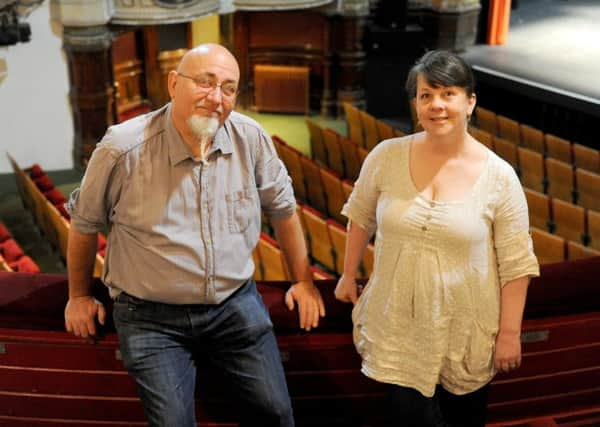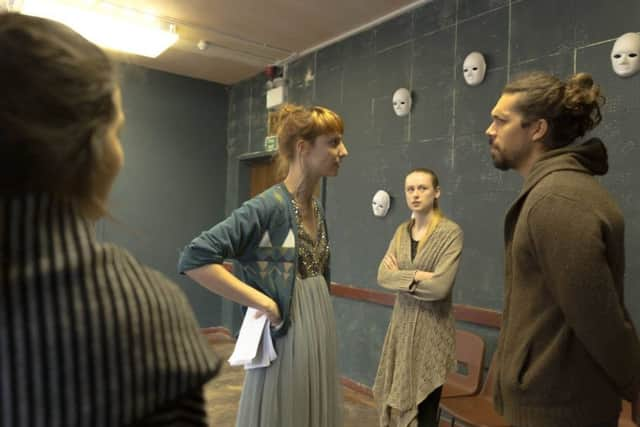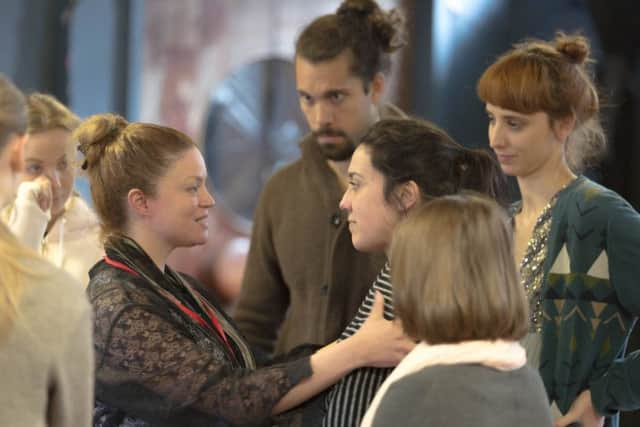New group based at the New Theatre Royal aims to give autistic and dyslexic creatives a voice


Jon Adams is a Portsmouth-based conceptual artist and writer. He also happens to be autistic, dyslexic and is a synaesthete – he feels sound.
He, like many others with autism, considers himself to be neurodivergent – a relatively new term. Neurodiversity refers to the infinite variety of the human brain and the way it works in individuals. Neurodivergent (ND) refers to having a brain that functions in ways that diverges significantly from what is generally understood as ‘normal’, or neurotypical.
Advertisement
Hide AdAdvertisement
Hide AdAnd he has been instrumental in helping set up Flow Observatorium (FlOb), which aims to become a national hub and centre of excellence for, and led by, neurodivergent artists. FlOb will support ND artists to make work, collaborate and engage within the cultural sector to help change attitudes and create equality.


Jon had the original idea, and working with Donna Bish at the New Theatre Royal, plus backing from Arts Council England, they set about making FlOb a reality.
‘Anything that gets the word out there is good,’ says Jon.
‘That’s kind of what Flow is about – getting a bit more visibility and then visibility leads to more support, and support leads to more parity and equality within the arts world and outside it too.’
One of the big stumbling blocks they’ve faced is lack of basic understanding of what autism and neurodivergence are: ‘If you ask a whole load of people if they know about autism, a high percentage of them will probably say yes, so the awareness is there, but we’re not saying they’re aware of the right things!’
Advertisement
Hide AdAdvertisement
Hide Ad

Many people view autism as a negative condition, something to be ‘suffered’, but this is an attitude Jon and FlOb want to change.
‘If you look at autism and the way people are wired up differently – as a natural part of humanity, rather than as something of a deficit – we need lots of people who can think differently – if everyone thought the same way, we’d all jump off the cliff.
‘There have been times in world history where we’ve needed people who look at the world very differently and people who are neurodivergent.
‘It’s about differing from the norm – what people consider the normal way of thinking, the majority way of thinking, the typical way of thinking.
Advertisement
Hide AdAdvertisement
Hide Ad

‘If you look at neurodivergent as being like biodiversity – a whole world made of cats wouldn’t be very good – you need all the different types of animals interacting.
‘It’s the same with neurodivergence, we need that difference, we need everyone thinking in their own way, otherwise things don’t happen. Barnes Wallis wouldn’t have imagined the bouncing bomb, Alan Turing wouldn’t have had the belief in himself that he could do what he did. People who are neurodivergent often get left out.
‘We’re great at ideas, we’re great at putting things together. We’re not so great at social stuff and speaking loudly for ourselves.’
And this is, as Jon points out, because neurodivergent people are often not so good at the social side of life. They also often experience bullying at school and have mental health problems. FlOb aims to address this as well.
Advertisement
Hide AdAdvertisement
Hide Ad

‘If you walk into an A&E department with a broken leg they treat you straight away. If you go in with a slightly broken head and they say go away and come back in three months if you need it. Would you treat the person with the broken leg like that? No. And as an autistic person you often don’t push it so you suffer in silence.
‘Weaving all of this together and from personal experience, I thought something’s got to happen, because there’s a lot of talent that goes unsupported and unobserved.
‘Sometimes the disabilities arts people don’t get it right because they’re not neurodivergent, and sometimes the mainstream doesn’t get it right because they can’t imagine what it feels like to be us.
‘That’s what we’re here to change, it’s the peer-to-peer support and encouragement for autistic artists. There is no real organised route through for young people to go into the arts, and I hate using this term, that’s autistic friendly. We prefer to use autistic enabling instead.
Advertisement
Hide AdAdvertisement
Hide Ad‘You can put on an “autism-friendly” show and we don’t really know what that means, it doesn’t really mean anything, it doesn’t imply that the place doing it has to do anything, but if it’s autism enabling, then the onus is on them to do something, and to do that, they have to understand about neurodivergence, autism and dyslexia – it’s that understanding that Flow wants to get out there.’
While FlOb is based here for now, it aims to be a nationwide group, working as ‘a bridge’, between the neurotypical and ND spheres.
‘You can shout at people for not understanding, but it’s better to sit down and talk with them. We need to have allies in the neurotypical world as well as the ND world because it’s only through cooperation and understanding that things will change. Flow wants to walk that middle line, which can often be difficult.’
And he draws a comparison between the ND experience and that of the gay rights movement.
Advertisement
Hide AdAdvertisement
Hide Ad‘Forty years ago someone who was gay would have been classed as having a disability. Up until ’92 it was considered a mental health issue, which was when the World Health Organisation removed it. It’s shocking isn’t it? Being gay is an innate way of thinking, which is exactly what we are.
‘We’re almost following in the gay rights movement’s footsteps – they’ve set a great example. We face the same social barriers – people don’t like the way they think, they don’t like the way we think.
‘It’s all about diversity and recognition. Different but equal.’
__________________________________________________________________
‘I bet you have never been on a trip like this before...’
Advertisement
Hide AdAdvertisement
Hide AdNeurodivergent artists have created an immersive piece of theatre which will be debuted at the New Theatre Royal.
NTR associate artists DYSPLA have been working with Flow Observatorium on You Will Fail Her.
This immersive and interactive experience takes the audience on an emotional journey where they can explore the effects of mental health on dyslexic students at the hands of a failed education system.
The audience are introduced to the experience through the character Hope, who takes them on a trip through the psyche of a dyslexic child and makes sure they are prepared for every stage of their journey.
Advertisement
Hide AdAdvertisement
Hide AdThe audience will experience what it is like to be a dyslexic child and gain an understanding of how dyslexia can cause anxiety, sadness and depression and how this trauma can affect the family.
The audience are asked to interact with the protagonist throughout the piece and document their journey using their phones to take pictures and record their experience. Much like a personal journal or diary of trip the audience will be able to explore their own personal discovery documenting what they are experiencing and their emotional response. This data will be woven into the soundscape created by resident artist Jon Adams for future performances.
Its writer, Lennie Varvarides, described it as entering ‘a world of movie projection, giant balloons and the soundscape of your inner voice.
‘Revisiting your own childhood and there among the memories, reliving a trauma so unforgivable that even you will feel the guilt of a system that continues to fail its children.’
It is at New Theatre Royal in Guildhall Walk, Portsmouth, on September 21 and 22, from 7pm. Tickets £10. Go to newtheatreroyal.com